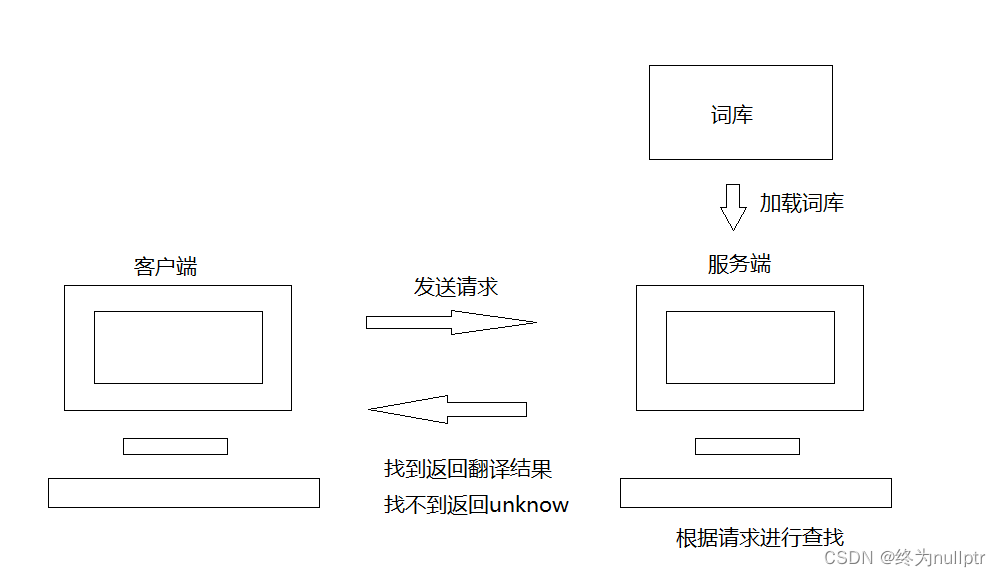前言
上一篇文章中,我们使用UDP协议编码完成了一个简单的服务器,实现数据通信,服务器设计出来后目的不仅仅只是实现数据通信,而是根据客户端发过来的请求,实现一定的需求,今天我们要介绍的是当客户端给服务端发送英文单词,然后服务端获取客户端的请求,将翻译结果返回给客户端,通过这样的方式,实现了一款英文翻译服务器。下面我们就一起具体来看看是如何编码完成。
1.设计思路:
如图所示

第一步:启动服务器,然后服务器加载词库
第二步:客户端向服务器,发送请求
第三步:服务器处理请求查找单词,将查找结果返回给客户端
第四步:客户端获取查询结果
2.词库设计
说明:在这里只是简单模拟实现一个词库,主要是实现业务逻辑
dict.txt:
aunt:姨母
brother:兄弟
cousin:堂兄弟
couple:夫妇
dad:爸爸
daughter:女儿
family:家
father:爸爸
grandchild:孙子
granddaughger:孙女
grandfather:祖父
grandma:外婆
grandpa:外公
granny 老奶奶
3.设计客户端
udpClient.hpp
#pragma once
#include <iostream>
#include <string>
#include <strings.h>
#include <cerrno>
#include <cstring>
#include <cstdlib>
#include <functional>
#include <unistd.h>
#include <sys/types.h>
#include <sys/socket.h>
#include <arpa/inet.h>
#include <netinet/in.h>
namespace Client
{
using namespace std;
class udpClient
{
public:
udpClient(const string &serverIp, const uint16_t serverPort)
: _serverIp(serverIp), _serverPort(serverPort), _sockfd(-1) {}
void initClient()
{
_sockfd = socket(AF_INET, SOCK_DGRAM, 0);
if (_sockfd == -1)
{
cerr << "socket error:" << errno << strerror(errno) << endl;
exit(2);
}
}
void run()
{
struct sockaddr_in server;
memset(&server, 0, sizeof(server));
server.sin_family = AF_INET;
server.sin_addr.s_addr = inet_addr(_serverIp.c_str());
server.sin_port = htons(_serverPort);
while (1)
{
string message;
cout << "请输入你想要翻译的单词:";
getline(cin,message);
//发送请求
sendto(_sockfd, message.c_str(), message.size(), 0, (const struct sockaddr *)&server, sizeof(server));
char buffer[1024];
struct sockaddr_in temp;
socklen_t len = sizeof(temp);
//接受查询翻译结果
size_t n = recvfrom(_sockfd, buffer, sizeof(buffer) - 1, 0, (struct sockaddr *)&temp, &len);
if (n >= 0)
buffer[n] = 0;
cout << "翻译的结果为: " << buffer << endl;
}
}
private:
string _serverIp;
int _sockfd;
uint16_t _serverPort;
};
}
udpClient.cc:启动客户端
#include"udpClient.hpp"
#include<memory>
using namespace Client;
static void Usage(string proc)
{
cout << "\nUsage:\n\t" << proc << " server_ip server_port\n\n";
}
int main(int argc,char* argv[])
{
if(argc != 3)
{
Usage(argv[0]);
exit(1);
}
string serverip = argv[1];
uint16_t serverport = atoi(argv[2]);
unique_ptr<udpClient> uct(new udpClient(serverip,serverport));
uct->initClient();
uct->run();
return 0;
}
4.设计服务端
udpServer.hpp
#pragma once
#include <iostream>
#include <string>
#include <strings.h>
#include <cerrno>
#include <cstring>
#include <cstdlib>
#include <functional>
#include <unistd.h>
#include <sys/types.h>
#include <sys/socket.h>
#include <arpa/inet.h>
#include <netinet/in.h>
namespace Server
{
using namespace std;
const static string defaultIP = "0.0.0.0";
enum {USAGE_ERR = 1, SOCKET_ERR, BIND_ERR,OPEN_ERR};
typedef function<void(int,string,uint16_t,string)> func_t;
class udpServer
{
public:
udpServer(const func_t& cb,uint16_t port, const string &ip = defaultIP)
:_callback(cb),_port(port),_ip(ip),_sockfd(-1)
{}
void initServer()
{
_sockfd = socket(AF_INET,SOCK_DGRAM,0);
if(_sockfd == -1)
{
cerr<<"socket error:" << errno << strerror(errno) << endl;
exit(SOCKET_ERR);
}
struct sockaddr_in local;
bzero(&local,sizeof(local));
local.sin_family = AF_INET;
local.sin_port = htons(_port);
local.sin_addr.s_addr = htonl(INADDR_ANY);
int n = bind(_sockfd,(struct sockaddr*)&local,sizeof(local));
if(n == -1)
{
cerr<<"bind error:" << errno << strerror(errno) << endl;
exit(BIND_ERR);
}
}
void startServer()
{
char buffer[1024];
for(;;)
{
struct sockaddr_in peer;
socklen_t len = sizeof(peer);
ssize_t s = recvfrom(_sockfd,buffer,sizeof(buffer)-1,0,(struct sockaddr*)&peer,&len);
if(s)
{
buffer[s] = { 0 };
string clientIp = inet_ntoa(peer.sin_addr);
uint16_t clientPort = ntohs(peer.sin_port);
string message = buffer;
cout << clientIp << "[" << clientPort << "]" << message << endl;
//服务器只负责接受数据,处理方法采用回调的方式交给上层处理
_callback(_sockfd,clientIp,clientPort,message);
}
}
}
~udpServer()
{}
private:
uint16_t _port;
string _ip;
int _sockfd;
func_t _callback;
};
}
udpServer.cc:启动服务端
#include "udpServer.hpp"
#include <memory>
#include <unordered_map>
#include <fstream>
using namespace Server;
static void Usage(string proc)
{
cout << "\nUsage:\n\t" << proc << " local_port\n\n";
}
const string DictTxt = "./dict.txt";
unordered_map<string,string> dict;
static bool cutString(string& str,string& s1,string& s2,const string& sep)
{
auto pos = str.find(sep);
if(pos == string::npos)
return false;
s1 = str.substr(0,pos);
s2 = str.substr(pos + sep.size());
return true;
}
static void initDict()
{
ifstream in(DictTxt,ios::binary);
if(!in.is_open())
{
cerr << "open fail:" << DictTxt << "error" << endl;
exit(OPEN_ERR);
}
string line;
string key,value;
while(getline(in,line))
{
if(cutString(line,key,value,":"))
{
dict.insert(make_pair(key,value));
}
}
in.close();
cout << "load dict success" << endl;
}
//翻译:
void TranslationWord(int sockfd,string clientIp,uint16_t clientPort,string message)
{
string response_message;
auto iter = dict.find(message);
if(iter == dict.end())
response_message = "unknown";
else
response_message = iter->second;
struct sockaddr_in client;
bzero(&client, sizeof(client));
client.sin_family = AF_INET;
client.sin_port = htons(clientPort);
client.sin_addr.s_addr = inet_addr(clientIp.c_str());
sendto(sockfd, response_message.c_str(), response_message.size(), 0, (struct sockaddr*)&client, sizeof(client));
}
int main(int argc, char *argv[])
{
if (argc != 2)
{
Usage(argv[0]);
exit(USAGE_ERR);
}
//加载词库
initDict();
uint16_t port = atoi(argv[1]);
unique_ptr<udpServer> usvr(new udpServer(TranslationWord,port));
usvr->initServer();
usvr->startServer();
return 0;
}
5.编译客户端和服务端
makefile:
.PHONY:all
all:udpServer udpClient
udpServer:udpServer.cc
g++ -o $@ $^ -std=c++11
udpClient:udpClient.cc
g++ -o $@ $^ -std=c++11
.PHONY:clean
clean:
rm -f udpServer udpClient
6.测试结果

如图所示:服务端能够准确处理客户端的请求,将翻译查询结果返回给客户端
7.总结
以上就是使用UDP协议实现的一款翻译服务器,细心的小伙伴也已经发现了,在上面的代码中服务器的任务只是接受请求,然后将请求的数据回调处理,让上层处理业务逻辑,这样的实现方式实现了服务器与业务逻辑代码之间的解耦,如果以后想实现一款别的需求的服务器,只需要更改上层的业务逻辑就可以了。
版权归原作者 终为nullptr 所有, 如有侵权,请联系我们删除。